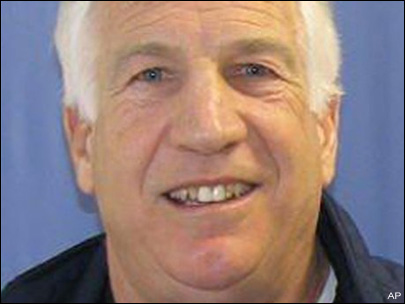Does Jerry Sandusky Have Histrionic Personality Disorder?

The first witnesses are being called for the defense in the sex-abuse case of former Penn State assistant coach Jerry Sandusky.
Some eyebrows were raised when Judge John McCleland ruled that a psychiatrist could testify early this week about a psychiatric condition called histrionic personality disorder (HPD). Observers are wondering if the defense is suggesting that a personality disorder explains some of the charges against Sandusky.
The prosecution says that Sandusky had extensive correspondences with at least one of the alleged victims. But defense attorney Karl Rominger wrote in his filing to Judge McCleland that:
The jury should not be misled into believing these statements and actions are likely grooming when they are just as likely or more likely histrionic in origin.
What is Histrionic Personality Disorder?
According to the National Institutes of Health, histrionic personality disorder is a condition in which people act in a very emotional and dramatic way that draws attention to themselves.
The cause of this disorder is unknown. Both genes and early childhood events are thought to contribute. It occurs more often in women than in men, although it may be diagnosed more often in women because attention-seeking and sexual forwardness are less socially acceptable for women.
Histrionic personality disorder usually begins in early adulthood.
People with this disorder are usually able to function at a high level and can be successful socially and at work.
Symptoms include:
- Acting or looking overly seductive
- Being easily influenced by other people
- Being overly concerned with their looks
- Being overly dramatic and emotional
- Being overly sensitive to criticism or disapproval
- Believing that relationships are more intimate than they actually are
- Blaming failure or disappointment on others
- Constantly seeking reassurance or approval
- Having a low tolerance for frustration or delayed gratification
- Needing to be the center of attention (self-centeredness)
- Quickly changing emotions, which may seem shallow to others
Like other personality disorders, histrionic personality disorder is diagnosed based on a psychological evaluation and the history and severity of the symptoms.
People with this condition often seek treatment when they experience depression or anxiety from failed romantic relationships or other conflicts with people. Medication may help the symptoms, but talk therapy (psychotherapy) is the best treatment for the condition itself.
If he has it, what affect can this have on Sandusky’s trial?
Even if he has the disorder, experts cast doubt that it would vindicate Sandusky.
Elyn Saks, Associate Dean and Professor of Law, Psychology, and Psychiatry at University of Southern California Gould Law School, told ABC News that the legal argument would be a “stretch:”
Typically, for an insanity argument, a person must be out of touch with reality at the time of the crime.It is very strict. While personality disorders can have transient psychotic symptoms, this would be a stretch as a viable argument.
What do you think? If you were on the jury, do you think you would you believe this argument?
























0 comments